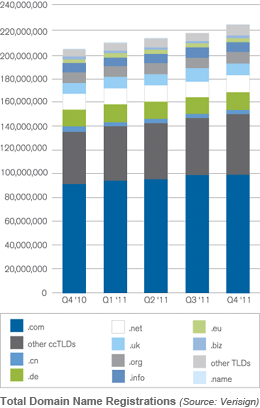

Efforts to take down websites for copyright infringement are likely to move beyond U.S.-based domain name registries, with ICANN promising to more closely cooperate with global law enforcement agencies and governments. During an open session with the Government Advisory Committee (GAC), the ICANN board confirmed that it will enforce its contracts with registrars more effectively in order to meet expectations from governments and law enforcement authorities. more
ICANN has appointed IID President and CTO Rod Rasmussen to its Security and Stability Advisory Committee (SSAC). An area that Rasmussen's work and recent SSAC reports have both covered in-depth is domain name hijacking. Recent hijackings against UFC.com and Coach.com, and similar past attacks against CheckFree, Comcast and Twitter have heightened awareness about the security dangers with the Internet's infrastructure. more
ICANN needs to strengthen conflict-of-interest policies for its board of directors, said Rod Beckstrom, CEO, in his opening remarks during the organizations 43rd public meeting in San Jose, Costa Rica. "It is time to further tighten up the rules that have allowed perceived conflicts to exist within our board. ... ICANN must place commercial and financial interests in their appropriate context," said Beckstrom, who plans to step down in July. "How can it do this if all top leadership is from the very domain name industry it is supposed to coordinate independently?" more
The NATO Consultation, Command and Control Agency (NC3A) has announced the award of a contract for upgrading the NATO cyber defence capabilities. The award to private industrial companies will enable the already operating NATO Computer Incident Response Capability (NCIRC) to achieve full operational capability by the end of 2012. At approximately 58 million Euro, it represents NATO's largest investment to date in cyber defence. more
Brian Krebs reporting in Krebs on Security: "Half of all 'rogue' online pharmacies -- sites that sell prescription drugs without requiring a prescription -- got their Web site names from just two domain name registrars, a study released today found. The findings illustrate the challenges facing Internet policymakers in an industry that is largely self-regulated and rewards companies who market their services as safe havens for shadowy businesses." more
The United States government has cancelled IANA Request for Proposal (RFP) SA1301-12-RP-IANA according to an updated page made today on the FedBizOpps website. The change -- time stamped Mar 09, 2012 2:44 pm -- states: "The Department of Commerce intends to reissue the RFP at a future date, date to be determined (TBD). Interested parties are encouraged to periodically visit www.fbo.gov for updates." more
 According to the latest Domain Name Industry Brief from VeriSign, Inc., the fourth quarter of 2011 closed with a base of more than 225 million domain name registrations across all Top-Level Domains (TLDs) -- an increase of 5.9 million domain names, or 2.7 percent over the third quarter. Registrations have grown by more than 20.4 million, or 10 percent, since the fourth quarter of 2010, according to the report. more
According to the latest Domain Name Industry Brief from VeriSign, Inc., the fourth quarter of 2011 closed with a base of more than 225 million domain name registrations across all Top-Level Domains (TLDs) -- an increase of 5.9 million domain names, or 2.7 percent over the third quarter. Registrations have grown by more than 20.4 million, or 10 percent, since the fourth quarter of 2010, according to the report. more
A group of ISPs on wednesday told U.S. Congress that passing new cybersecurity rules affecting broadband and mobile service providers is counterproductive and should be resisted. Jason Livingood, vice president of Internet systems engineering at Comcast, during a hearing before the U.S. House of Representatives Energy and Commerce Committee's communications subcommittee, said: ISPs have "strong incentives" to secure their networks and invest heavily in cybersecurity because of competition. more
Reporting further on the recent Bodog.com domain name seizure case based on gambling charges, Michael Geist writes: "In the Bodog.com case, U.S. officials targeted a site with limited connections to the country as the site had licensed out the bodog.com domain name in 2006 and stopped accepting U.S. bettors late last year. The legal issues surrounding its operations will be played out in court, but the manner in which the bodog.com name was seized could have a lasting impact on Internet governance." more
Number of malware threats that receive instructions from attackers through DNS is expected to increase, and most companies are not currently scanning for such activity on their networks, security experts said at the RSA Conference 2012 on Tuesday. While most malware-generated traffic passing through most channels used for communicating with botnets (such as TCP, IRC, HTTP or Twitter feeds and Facebook walls) can be detected and blocked, it's not the case for DNS (Domain Name System) and attackers are taking advantage of that, said Ed Skoudis, founder of Counter Hack Challenges and SANS fellow. more
 During the Mobile World Congress 2012, Google's executive chairman Eric Schmidt, today warned against United Nations' treaty aimed at bringing more Internet regulation. "That would be a disaster... To some, the openness and interoperability is one of the greatest achievements of mankind in our lifetime. Do not give that up easily. You will regret it. You will hate it, because all of a sudden all that freedom, all that flexibility, you'll find it shipped away for one good reason after another." more
During the Mobile World Congress 2012, Google's executive chairman Eric Schmidt, today warned against United Nations' treaty aimed at bringing more Internet regulation. "That would be a disaster... To some, the openness and interoperability is one of the greatest achievements of mankind in our lifetime. Do not give that up easily. You will regret it. You will hate it, because all of a sudden all that freedom, all that flexibility, you'll find it shipped away for one good reason after another." more
Brian Krebs reporting in Krebs on Security: "Millions of computers infected with the stealthy and tenacious DNSChanger Trojan may be spared a planned disconnection from the Internet early next month if a New York court approves a new request by the U.S. government. Meanwhile, six men accused of managing and profiting from the huge collection of hacked PCs are expected to soon be extradited from their native Estonia to face charges in the United States." more
McDowell, commissioner of the Federal Communications Commission, in an op-ed in the Wall Street Journal writes: "On Feb. 27, a diplomatic process will begin in Geneva that could result in a new treaty giving the United Nations unprecedented powers over the Internet. Dozens of countries, including Russia and China, are pushing hard to reach this goal by year's end. As Russian Prime Minister Vladimir Putin said last June, his goal and that of his allies is to establish "international control over the Internet" through the International Telecommunication Union (ITU), a treaty-based organization under U.N. auspices." more
Google reports that its "experimental" public DNS service launched in December of 2009 has now passed 70 billion requests a day and no longer considered experimental. From the announcement: "Google Public DNS has become particularly popular for our users internationally. Today, about 70 percent of its traffic comes from outside the U.S. We’ve maintained our strong presence in North America, South America and Europe, and beefed up our presence in Asia. We've also added entirely new access points to parts of the world where we previously didn't have Google Public DNS servers, including Australia, India, Japan and Nigeria." more
A Canadian law expected to be introduced next week could greatly assist law enforcement authorities in the country to access date revealing internet-user habits and personal information. Privacy watchdogs caution if the so-called Lawful Access law is passed, it would give police access to webbrowsing history and sensitive personal information, and would grant greater permission to track the cellular phones of suspects -- much of it without the requirement of a warrant. more
Sponsored byIPv4.Global

Sponsored byVerisign

Sponsored byDNIB.com

Sponsored byWhoisXML API

Sponsored byRadix

Sponsored byVerisign

Sponsored byCSC
